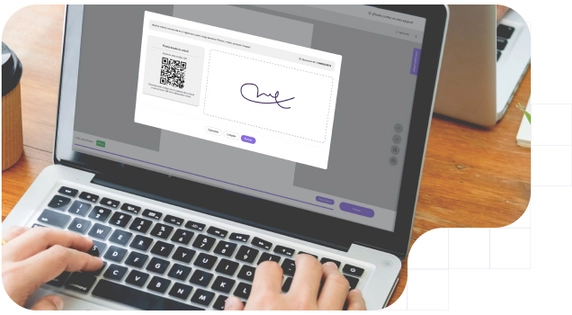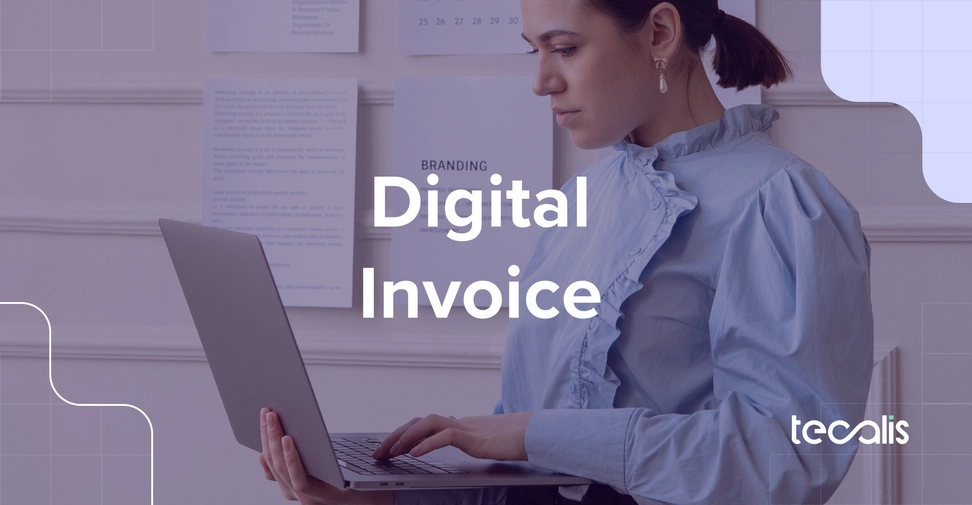Index
Get the latest news right in your inbox
Digital invoicing has been standardized for years within the framework of the business-to-government (B2G) relationship. However, its use between companies, the self-employed, and between companies and individuals still has some way to go.
This digital invoicing model is regulated by all EU member states and the new regional and local regulations that are already being approved make it mandatory in all areas in the immediate future.
In an increasingly digitized, paperless economy where steps are being taken to reduce complexity and bureaucracy in favor of simplicity and agility, the transition to this model now seems an insurmountable necessity and a legal obligation.
What is a digital invoice?

A digital invoice is a commercial document in an electronic format that includes data and precise information about a commercial agreement for the provision of services or the purchase and sale of products. It is basically the digital transposition of the classic invoice model we all know.
The difference between digital invoices and traditional invoices lies in their creation, sending, and storage, since the former is generated by digital invoicing software, stored in computer systems, and can be sent through different certified digital communication channels (eNotice / eFax).
Digital invoices are fully equivalent to paper invoices and have the same validity when justifying the delivery of a good or payment for a service. However, if a digital invoice includes identity elements as required by the latest regulations, it has a higher legal backing, greater consideration in disputes, and guarantees non-repudiation thanks to its delivery by certified electronic means.
Electronic or digital invoice
There is some confusion regarding the terms "electronic invoice" and "digital invoice". Although both can function as perfect synonyms, they tend to intermingle and each is used mostly in different contexts.
An electronic invoice refers to the regulatory standard that defines what an invoice in electronic format is. In other words, we will encounter this term more when - in a professionalized way - we are talking about the formal requirements that must be followed for these invoices to be valid in the eyes of society, the economy, and public administrations (and to be accepted by them through electronic and telematic means).
The term "digital invoice", on the other hand, is broader and more versatile and can be used to identify a paper invoice that has been scanned (digitalized). However, this does not have the formal and official consideration of an electronic invoice, since it does not meet the specific requirements established by the laws that regulate this type of invoice. The same happens with those invoices created digitally with digital invoicing software but which do not comply with the formal and technical characteristics required by the regulators.
Digital Invoicing
Electronic and digital invoices must comply with a series of specific rules to be considered as such:
- Authenticity at source: The identities of both the obligor and the issuer must be guaranteed by electronic means (eIDAS regulation). This is done through an advanced electronic signature with a recognized certificate, EDI data exchange or electronic means that guarantee a reliable audit trail.
- Content integrity: Secure IT technologies and means shall be used to ensure that the digital invoice cannot be altered and, in case of modifications, a time-stamped record of the changes made to the invoice is attached. For this purpose, digital signature technologies and end-to-end blockchain encryption are often used.
- Data readability: The information contained in the invoice must be readable without difficulty by both humans and computer systems according to the most common data extraction standards. This depends largely on the sending methods and the format chosen by the sending and receiving systems (XML, FTP, Facturae, indexable PDF with electronic signature, EDI, EDIFACT, PEPPOL...).
Digital invoicing systems must generate and send invoices in accordance with these requirements, although the rules of each state and region must be taken into account, especially in those where it is mandatory.
Documenting commercial transactions digitally allows businesses to streamline their processes and respond to tax and payment delay challenges. Given the problems that the traditional offline invoicing model has been generating for some time, we can see that in markets such as Europe, 85% of countries have already passed laws requiring the creation and issuance of digital invoices. Otherwise, they are exposed to serious penalties and their invoices have no economic or legal validity.
Mandatory eInvoice

In countries such as Spain, a horizon and deadline have been set for the global use of digital invoicing in all areas of the economy. Since 2015, all companies and self-employed professionals that had any relationship with a public body or administration had to use electronic invoices.
Now, the newest regulations introduce the obligation to have a digital invoicing system in place within 1 year from the regulatory development of the new e-invoicing standard for companies whose turnover exceeds 8,000,000 euros and within 2 years for those that do not exceed the same turnover.
Digital certificate on e-Invoices
The best electronic signature applications have the ability to store digital certificates for use in any shipment. This electronic certificate manager is convenient and can embed the signature with the certificate in documents such as a digital invoices.
To sign digital and electronic invoices, in countries such as Spain, the AEAT admits the use of recognized digital certificates. The FNMT indicates that a digital certificate can be used in invoices whether it is for a legal entity or for representation and natural person certificates generated by the FNMT or other RegTech players that meet the minimum requirements and standards established by law.
These certification services for digital invoices are generally used for the case previously mentioned: the exchange of digital invoicing information between companies and public entities. However, the standards that define the new mandatory use of digital invoicing do not require the use of digital certificates in invoices as long as the software that generates them meets the requirements of authenticity, integrity, identification, and legibility set out in the regulations.
Digital Kit and electronic invoicing
We can see the relevance of eInvoicing in countries such as Spain through initiatives such as the Digital Kit Program, which is aimed at boosting the digitalization of SMEs and self-employed professionals. Thanks to this program (backed by the European Union), companies can obtain up to €12,000 in grants to digitize their processes and adapt to the new digital economy.
Digital vouchers are provided by categories of digitalization areas in a company. Given the obligation to have digital invoice software in the coming years, one has been created so that companies can obtain this system completely free of charge and easily.
Tecalis experts are helping hundreds of small and medium-sized companies - as well as independent professionals - to apply for their Digital Kit grants for electronic signature and invoicing.
Examples of digital invoices and its benefits

There are dozens of examples of the advantages of digital invoicing and, as we have seen, there are different data standards and methods of sending electronic invoices. Whether it is the format, the channel or the technologies that guarantee the identification requirements, we can find several options. These can be consulted in the other article on electronic invoicing in this Tecalis blog.
Although there are dozens of them, the main benefits of electronic invoices experienced by companies that have successfully and easily implemented their use are the following:
- Time: Having a digital invoicing system in place greatly increases productivity and reduces bureaucracy. With preset templates and automatic sending functionalities (among many other innovative features such as the use of GPT Chat), digital signature and invoicing platforms leave professionals time to focus on high-value work.
- Legality and Support: Did you know that more than 60% of companies and professionals working in Europe indicate that they do not receive their invoice payments in due time and form? The electronic and digital invoice comes to solve this problem with a strong statement: the issuance of a digital invoice is legally binding. This means that in the event of a dispute - and with the appropriate means of traceability of a digital invoicing solution - the resolution of a non-payment is immediate. Moreover, for governments, this new invoice model helps to combat tax fraud.
- Saving space: The cost of storing commercial documentation in many companies amounts to high amounts. In addition, regulations in many regions require them to be kept for a certain period of time, which entails a great expense in resources of all kinds. With the new electronic signature and invoice software and platforms (which include document management and custody in compliance with data protection and privacy standards), this expense is reduced to zero.
- Paper savings: Beyond the economic impact (not only for paper but also for ink, printers, etc.), there is the environmental impact, which helps many businesses in their carbon-neutral goals.
- Invoicing, management, handling, and processing costs: The great ally of the accounting, logistics, and supply chain areas. Perfect accounting management, especially through the use of digital invoicing formats such as FTP, XML, or EDI-based templates.
























